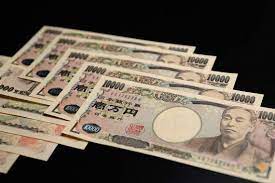LONDON (Reuters): The yen rose on Monday, though it remained not far from a more than seven-month low after an official said Japan was not ruling out any options in responding appropriately to excessive currency moves.
The Japanese currency has come under pressure in recent weeks amid the stark contrast between the Bank of Japan’s (BOJ) ultra-low rates and central banks elsewhere, which have been heavily hiking their interest rates.
The yen rose 0.33% to 143.23 per dollar by 1210 GMT, after Japan’s top currency diplomat, Vice Finance Minister for International Affairs Masato Kanda, stepped up warnings against recent yen weakening that was “rapid and one-sided”.
“Strong verbal intervention is driving the yen gains on the session,” said Shaun Osborne, chief currency strategist at Scotiabank in Toronto.
Elsewhere, the Russian rouble pared some losses after tumbling to a 15-month low against the dollar following dramatic weekend events in Russia, which saw an aborted mutiny by heavily armed mercenaries.
The rouble was 0.35% higher at 84.39, after hitting 87.23 in earlier trade, its weakest point since late March 2022.
Traders were closely monitoring developments in Russia after Wagner Group mercenaries withdrew from the southern Russian city of Rostov under a deal that halted their rapid advance on Moscow but raised questions about President Vladimir Putin’s grip on power.
“The armed uprising in Russia … despite being aborted, lay bare risks of Russian instability from within,” said Vishnu Varathan, head of economics and strategy at Mizuho Bank.
“Risk assets may generally not fare so well, especially if geopolitical risks re-emerge,” he added.
The dollar index found some safe-haven support also on lingering worries that the protracted monetary tightening cycles from major central banks would further hurt the global economic outlook.
The U.S. dollar index edged 0.09% lower at 102.66, after a gain of more than 0.5% last week, its first in nearly a month.
The euro rose 0.2% against the dollar to $1.0915 while traders awaited a speech later in the day by European Central Bank President Christine Lagarde at the 2023 ECB Forum on Central Banking.
A survey showed German business morale worsened for the second consecutive month in June, indicating that Europe’s largest economy faces an uphill battle to shake off the recession.
That added to data on Friday showing that eurozone business growth virtually stalled in June amid a deepening downturn in manufacturing activity and a slow expansion of the bloc’s dominant services industry.
Sterling was barely changed, down 0.01% to $1.2715, having fallen 0.8% last week after an outsized 50-basis-point rate increase from the Bank of England stoked fears of a British recession.
Flash Purchasing Managers’ Index (PMI) data on Friday showed Britain’s economy displayed signs of a slowdown this month but inflation pressures stayed high.
U.S. business activity fell to a three-month low in June and the contraction in the manufacturing sector deepened, though the overall picture indicated economic growth ticked up a notch in the second quarter.
In Asia, China on Monday returned from a holiday, leaving markets on the alert for further support measures from Beijing to stimulate the country’s faltering economic recovery.
The onshore yuan fell 0.7% to 7.2325 per dollar, after touching a seven-month low against the greenback.
The Turkish lira weakened to a record low after the central bank took steps towards simplification of its macroprudential framework, having hiked rates sharply last week.
The lira slid 2.7% as far as 25.96 against the dollar.







